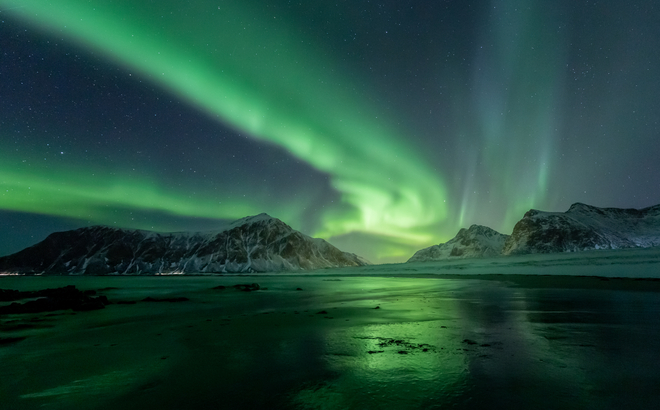Where Can I See the Northern Lights in Europe?

The northern lights cover the night sky with veils of green, pink, violet and indigo. This atmospheric phenomenon is fascinating, and many wish to see the magic with their own eyes. Are you wondering where and when to see the aurora borealis? We answer your questions in this article.
Where Can I See the Northern Lights?
In which countries can you see the aurora borealis? The northern lights usually form in areas close to the North Pole, in the “aurora zone” between 60 and 70 degrees latitude. This means that the aurora borealis forms along a belt linking central Alaska, Canada, the southern tip of Greenland, Iceland and northern Scandinavia (Denmark, Norway, Sweden).
Northern Lights in Iceland
Land of fire and ice, Iceland is also an excellent destination for a trip to see the northern lights. Between September and April, as the nights lengthen to nearly 20 hours in the dead of winter, you can see the northern lights throughout the country. However, there are some places with better visibility and an incomparable backdrop to see the aurora borealis: Thingvellir National Park, Ásbyrgi Canyon and Kirkjufell Mountain.
Northern Lights in Norway
Northern Norway, from the Lofoten Islands upward, is a good area to observe the aurora borealis with no light pollution. Big cities, fishing villages, wide open spaces... Wherever your trip to Northern Norway takes you, you will be able to watch the Northern Lights and enjoy activities typical of the region such as ice fishing, hiking, skiing, dog sledding and whale watching.
Northern Lights in Finland
In Finnish Lapland, the Northern Lights are visible about 200 nights a year, or every other night on a clear day. However, the best conditions to see the aurora borealis are between August and April. In Rovaniemi, the capital of Lapland, you can observe this magical astral phenomenon in and around the city, enjoy the wild Arctic landscape and visit Santa's Village (Joulupukin Pajakylä).
When Should I Take a Northern Lights Trip?
What is the best time of the year to see the northern lights? According to the statistics, the aurora borealis period extends from September to April. In reality, the northern lights occur throughout the year, but the light show is more visible when the nights are dark and long enough, during the cold seasons. They are also easiest to see in cold, dry, clear weather between 6:00 p.m. and 1:00 a.m.
What Formalities are Required to See the Northern Lights in Europe?
Are you a citizen of the European Union or Schengen Area (or associated states)? You can go see the aurora borealis in Iceland, Norway or Lapland with a national identity card or a passport valid for the duration of your stay.
Are you a citizen of a country outside the EU and Schengen Area? Depending on your country of origin, you may need a visa to enter the Schengen Area and see the northern lights from Europe. See here which countries need a Schengen visa.
- Do you need a Schengen visa? Go to the consulate’s website for the country in the Schengen Area where you wish to travel to obtain the necessary information and start your Schengen visa application, following the steps as indicated. Are you planning to travel to more than one of these destinations? Specify this in your Schengen visa application. Once you have obtained your visa, be sure to keep the supporting documents, including your proof of Schengen travel insurance, in case you are asked for them when entering the Schengen Area. Make sure to prepare all supporting documents concerning the reason for your stay in the Schengen Area, resources during your stay, your return ticket to your country of origin and proof of insurance covering medical and hospital expenses up to a minimum of €30,000.
- You don't need a visa? You can travel in the Schengen Area with a passport that is less than 10 years old and is valid for at least 3 months beyond your planned departure date. The border police may also ask you for other documents. Please note that as of November 2023, you will also need to apply for an ETIAS travel authorization.
Schengen Visa Insurance
Choose peace of mind for your visa application or when crossing the border with Schengen travel insurance policies from Europ Assistance. Recognised and accepted by Schengen embassies and consulates throughout the world, our policies cover your medical expenses for up to 60,000 euros in case of illness or accident in one of the Member States of the Schengen Area, as well as additional coverage, available here.
